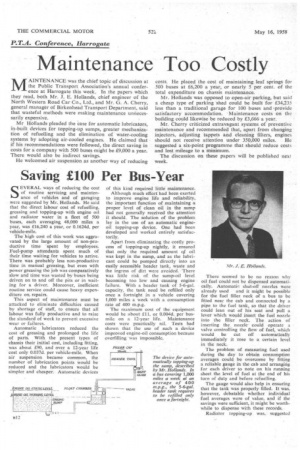P.T.A. Conference, Harrogate
Page 46

If you've noticed an error in this article please click here to report it so we can fix it.
Maintenance Too Costly
MAINTENANCE was the chief topic of discussion at the Public Transport Association's annual conference at Harrogate this week. In the papers which they read, both Mr. J. E. Hollands, chief engineer of the North Western Road Car Co., Ltd., and Mr. G. A. Cherry, general manager of Birkenhead Transport Department, said that wasteful methods were making maintenance unneces
sarily expensive. .
Mr Hollands pleaded the case for automatic lubricators, in-built devices for topping-up sumps, greater mechanization of refuelling and the elimination of water-cooling systems by adopting air-cooled engines. He claimed that if his recommendations were followed, the direct saving in costs for a company with 500 buses might be £9,000 a year. There would also be indirect savings.
He welcomed air suspension as another way of reducing costs. He placed the cost of maintaining leaf springs for 500 buses at £6,200 a year, or nearly 5 per cent. of the total expenditure on chassis maintenance.
Mr. Hollands was opposed to open-air parking, but said a cheap type of parking shed could be built for £34,235 less than a traditional garage for 100 buses and -provide satisfactory accommodation. -Maintenance costs on the building could likewise be reduced by £3,666 a year.
Mr. Cherry criticized extravagant systems of preventive maintenance and recommended that, apart from changing injectors, adjusting tappets and cleaning filters, engines should not receive attention under 350,000 miles. He suggested a six-point programme that should reduce costs and lost mileage to a minimum.
The discussion on these papers will be published nexl week.




































































































